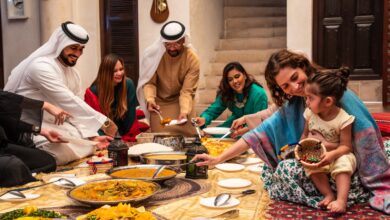Every year, the holy month of Ramadan comes with more food diversity and special dishes served only during this time. But this year, the trend might change, given the security situation and increased prices.
About a month before Ramadan, big supermarkets and patisseries usually start to present a huge variation of what Egyptians call "yameesh," an assortment of various nuts and dried fruits.
"We started two weeks before Ramadan as usual, but people this year are less interested in yameesh, maybe due to the revolution," a salesman at Al-Abd patisserie chain told Al-Masry Al-Youm. In contrast to the usual crowds, only a few people were shopping in the store.
Al-Ahram newspaper reported this week that yameesh imports cost US$20 million this year, while the usual amount is $100 million. The price of yameesh has risen.
There are multiple reasons imports are less this year and prices are up. Some supermarket owners are afraid of being robbed, and they aim to sell-out by the end of the holy month. Another factor is the turmoil in Syria, the main exporter, has affected the quantities imported to Egypt. Government monitoring is less than it is in past years, which enables merchants to gouge consumers.
"People this year won't put their earnings in food as usual. Most Egyptians don't feel financially secure," Ghada Ibrahim, a physiotherapist, told Al-Masry Al-Youm.
Also, people might prefer to put their money in things they might view as more important, like school fees or traveling to the coasts for vacations.
In the meantime, some people raised the issue on Facebook, asking Egyptians to stop importing yameesh and instead use the money to build Egypt and support the needy.
With names like "We can live without yameesh" and "We don't want to import yameesh or fawanees," various Facebook groups expressed concern over putting money into luxurious products like yameesh. This is especially true with the increased price of chicken, eggs, meat and other items.
A salesman at Seoudi Supermakerts told Al-Masry Al-Youm that the problem lies in the fact that people consume more than usual during Ramadan, despite the fact that most Muslims fast from dawn to dusk.
Traditions include cooking a duck on the first day of the holy month or baking famous Ramadan deserts (kunafa and atayef) on a daily basis.
But people may be preserving traditions while also shifting to more economic options. Shifting to herbal drinks – like hibiscus, for example – is cheap and more suitable to high temperatures.
Many families serve meat and chicken in large amounts and include items like soup, yoghurt and juice every day, in addition to inviting relatives and friends on the weekends.
"I don't agree that people should limit or stop inviting others, those meetings greatly enforce family ties," Nosayba Abu Zeid, a teacher, told Al-Masry al-Youm.
She added that housewives can gradually buy what they need to purchase so they don't spend a large sum of money all at once.
Ibrahim, however, believes that Carrefour and other hypermarkets are the best choice in this case.
She also suggests decreasing the amount of nuts in deserts and increasing consumption of fruits and natural juice to cope with hot weather.




